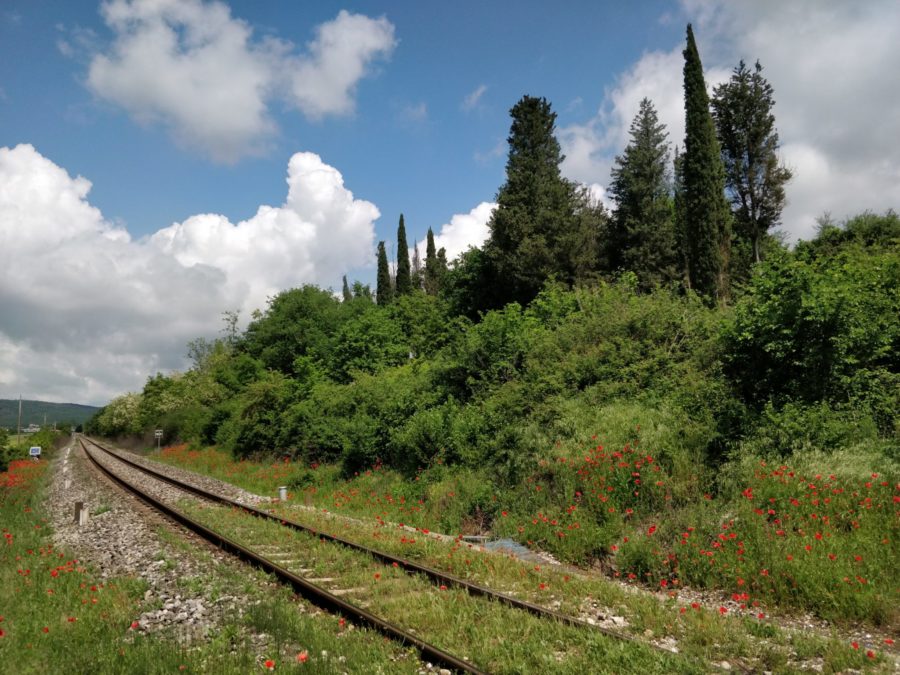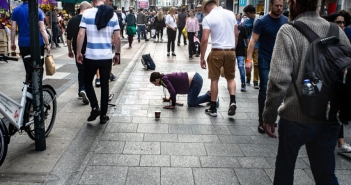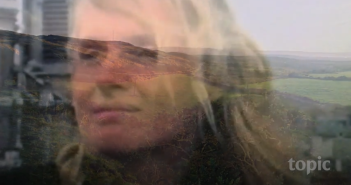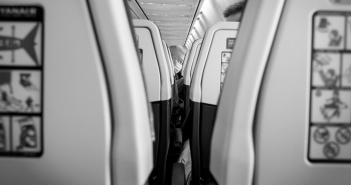Czech border police snoop along the rail carriage as we pass the frontier from Germany. They seem to linger outside our compartment long enough to survey the light pigmentation of the young Dutch couple and this Hiberno-Norman specimen inside, passing by without seeking identification.
White skin remains a passport – carte blanche – to unspoken liberties in ways most of us carriers hardly understand; a darker hue, with an out-of-date visa, might bring quiet indignities inside a dank room in some god-forsaken border-town.
Born in the city of Brody, near Lviv in present-day Ukraine in 1894, the novelist Joseph Roth wrote: ‘a human life nowadays hangs from a passport as it once used to hang by the fabled thread. The scissors once wielded by the Fates have come into the possession of consulates, embassies and plain clothes men.’ A melancholic alcoholic and wandering Jew, Roth committed suicide in Paris in 1939 before the cosmopolitan Old Europe he had evoked was consumed by the flames of racial hatred.
Human lives are dangling like threads from passports in Europe again as borders perceptibly harden: the sword of Damocles hangs over the Good Friday Agreement in Ireland, while in the UK at large, drawers are being scoured for the birth certificate of that long-lost grandparent that will yield the Paddy-pass. Throughout Europe, dour forms of patriotism exclude diversity; even in liberal, social-democratic Scandinavia shutters are coming down, as the Far Right surges.
Entirely open borders might be unworkable, but widespread anti-immigrant sentiment in Europe is rarely based on any rational assessment of the pros and cons of migration, but appears as an unconscious turning away from the world. After all, the European population is aging and many countries are short of workers in fields indigenous populations are reluctant to enter.
Racists identify the physical features of classes of people with defined cultural traits. This error is often a product of isolation, usually emanating from individuals living in ethnically homogeneous areas, especially small towns. Demagogues prey on those left behind by free-wheeling market economies, but the imagining of ‘them’ and ‘us’ is not purely economic in origin. It is also linked to a patriarchal sense of traditional family units being undermined by liberated women, open sexuality and even dietary choices. The ‘person of colour’ is another unwelcome intrusion of a modern world in flux.
Thus Hungarian President Viktor Orban’s offer to make women who bear four or more (presumably ‘pure-blooded’) children exempt from taxation is a chilling reminder of a time when women’s bodies were pressed into service for the imagined community of the nation. Across Europe an irrational fear of a ‘promiscuous’ Semitic ‘other’ is used to stoke hatred by unscrupulous politicians.
There is also a growing reassertion of the nation state, beyond Brexit. Thus the French government has withdrawn its embassy from Rome in the wake of the Populist Italian administration’s outspoken support for the revolutionary gilets jaune ‘yellow vest’ movement.[i]
Is this a turning of Europe’s mythological gyres: a cycle of one hundred years of recovery and prosperity, before decline and confrontation? The continent really needs to outgrow the truculent teenager phase, and instead rise to the challenge of making our way of life sustainable, and ultimately assist other parts of a world we have made in our own image of nation states.
Any retreat into sullen autarky appears untenable unless most of us are prepared to revert to being small farmers. We are, nevertheless, right to wonder whether European institutions have been overtaken by shadowy lobbyists serving multinational corporations. Big brands are strangling small enterprise, homogenising streetscapes, and upholding the grand theft of in-built-obsolesce underpinning our model of economic-growth-without-end. It begs the question: what keeps the European dream on track?
Romantic Travel
An extensive rail network is perhaps Europe’s greatest asset, and guarantor of a fluid community. Like the capillaries of a great oak, it connects the high branches of Scandinavia to the roots of Italy, and beyond. Whether high-speed behemoth, or squealing rust-heap, train-travel permits a form of contemplation distinctively European; where a delay is simply an invitation to read one’s book, engage in light conversation with travelling companions, or fix lunch.
I wonder whether future generations will experience the slow transitions in scenery, the fading grandeur of old world stations, and the whistle of the guard to set you on your way. Perhaps railways will give way to electric pods or warp drives, but I fear the best-laid techno-Utopian plans of Elon Musk and others will only cater to a select wealthy few. The benefits of railways, a technology that catalysed the Industrial Revolution, altering life on Earth forever, are likely to endure.
As Minister for Transport the current Irish Taoiseach Leo Varadkar described train travel as being for romantics.[ii] This suggests it is sensible to depend on stifling airports with queues and intrusive searches, before the deep vein thrombosis and ear-popping altitude of air travel. The rapid conveyance of tourists to safe spaces in historic cities has brought uniform hotels, chain restaurants and stores selling the same products, in different selfie locations.
For those unable to afford air travel there are bus services leaving from anonymous stations on the asphalt fringes of cities, before cramped seating and desolate road stops. Otherwise, there is the false freedom of a car, wheeling at high speed along a motorway from which nothing can be seen, and where road deaths are a permitted tribute to the car gods evoked by advertisers. All other passenger experiences pale by comparison with a train journey.
Sail-Rail
At times even I, a born-again railer, weary of train travel in Britain. The effects of a decidedly unromantic privatisation are apparent in the sardine can-spacing between seats, the gaudy plastic furnishings, and staggering crowds at peak times, which no doubt make bean counters beam. Wholescale privatisation of an inherently monopolistic service seems to have been the height of folly.
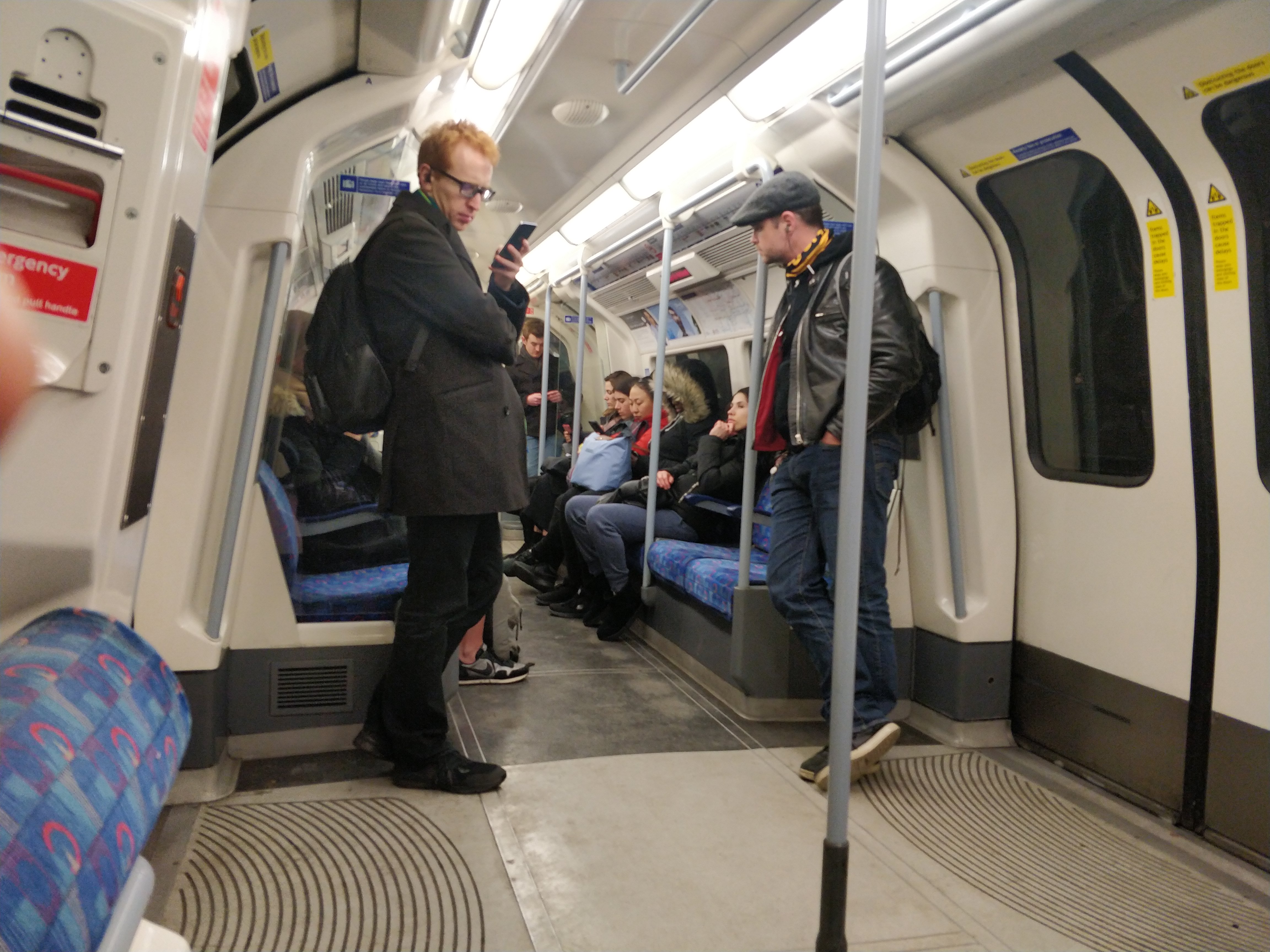
Unmistakably London.
Ticket prices are jarringly expensive too. For example, a journey of eighty-odd miles from Oxford to Birmingham costs over £38 one-way. A return costs much the same, which is of little use if you aren’t going back on your tracks.
There are cheap deals if you reserve in advance – though not on the Oxford-Birmingham line as it happens. A one-way ticket from Oxford to London is available for under £10, compared to the standard rate of £27. But booking weeks in advance negates the old world appeal of train travel, which is to turn up at a station, purchase a ticket and catch the next available service – setting off on a whim perhaps, along with a picnic basket.
One of the great mysteries of this life is how the Sail-Rail deal between the UK and Ireland has endured into present, unromantic, times. I can simply turn up at Dublin Port, purchase my ticket which includes the price of the ferry, before catching a train at a flat rate from Holyhead – with marginal increments depending on distance and speed of ferry – to anywhere in the UK. Very occasionally, after Christmas, or at summer’s end, there is insufficient space on the ferry for all passengers, but this is rare indeed. I only book in advance to avoid the small handling fee charged by Irish Ferries when you purchase at the Port.
Going Sail-Rail from the UK is even easier, as you purchase your ticket at any station – without the handling fee – just like a regular ticket. The full price of approximately €50 between London and Dublin may not be as low as the ludicrous cost of some plane tickets – a form of transport which, perversely, is not subject to the added cost of VAT on its fuel. But by the time you have born the cost of the Stansted train to London (usually costing £18), having avoided the crushing two-and-a-half-hour cheap bus alternative, you won’t be thanking uncle Michael.
Last time on Sail-Rail I went as far as Oxford, met friends for a lavish Indian supper, before wobbling cheerfully back to the station to resume my journey to London. At such times the Sail-Rail pass seems like a golden ticket inside Willy Wonka’s factory, as bemused attendants waive you onwards.
On the Irish side, the main inconvenience is the lack of a decent public transport connection between Dublin city and Port, which has no trains running along the tracks out to it. The 7.15am 153 bus from Westmoreland Street won’t even get you to the Port in time for the 8am sailing. Alas, the Dún Laoghaire-Holyhead connection, conveniently linked to a DART rail service, came to an end in 2015.
The other annoyance is the apparent unwillingness of the UK train companies to align their timetables with the arrival of the ferries, often meaning delays on arrival in insalubrious Holyhead. Contrast this with how on some European train-ferry lines – between Sicily and the Italian mainland, and Denmark and Germany – trains actually mount a ferry and trundle out the other side.
Delays, usually on Wales’s underfunded Arriva line, may require a longer stretch in the less than charming entrepôt, on an otherwise underrated coastline. The town’s appeal has changed little since Jonathan Swift’s 1727 evocation:
Lo here I sit at Holyhead
With muddy ale and mouldy bread
All Christian victuals stink of fish
I’m where my enemies would wish
Convict of lies is every sign,
The inn has not one drop of wine
I’m fasten’d both by wind and tide
I see the ship at anchor ride
The Captain swears the sea’s too rough
He has not passengers enough.
Holyhead notwithstanding, it is now possible to travel in one day, using Sail-Rail and Eurostar, from Dublin Port, via London Euston, proceeding by foot to King’s Cross St. Pancras, to Brussels or Paris. I dream of more links from Holyhead to major UK cities, especially London, and perhaps even a high speed spur through Wales. That might tempt a few more romantics out of taking flights, and make life on our island seem less insular.
Inter-Rail
Last month I purchased an Inter-Rail pass, giving me five days of unlimited travel within a month throughout Europe for €300; albeit with some high-speed lines (especially, inconveniently, in France if you are arriving from Ireland) requiring a reservation, and/or the payment of a supplement. There are, however, reductions available on ferry prices, and with an overnight journey you only need to use up one day of your allotment.
Having taken the Eurostar from London on the new service to Amsterdam, I proceeded immediately to Hamburg, Germany’s understated and cosmopolitan second city. I then headed north, through Denmark, crossing the Copenhagen-Malmo bridge into Sweden, arriving above the snowline in Oslo. I had not maximised my first three day’s travel, but made it as far as I needed.

Cross-country skiing near Oslo, Norway.
After enjoying an all-too-brief cross-country skiing trip with Irish friends now resident there, which included another short train journey into the hills, along with our skis, I returned south. This time taking two days (overnighting in Copenhagen) to get to the Czech Republic.
Arriving in a continental climate with further snow cover, I proceeded east by train out of Prague towards the Jesiniky mountains. This involved a journey on one of a growing number of private lines – the Leo Express – which provides a degree of pampering and efficiency beyond that associated with the state railway company, Cesky Drahy, and cheap deals if you book in advance.
At first blush, this would suggest partial or limited privatisation brings benefits. But I rather suspect that once this neo-liberal genii of de-regulation is let out of the bottle it will be reluctant to return. I expect further calls (in a subservient media) for privatisation in the name of efficiency, preceding a carve-up unfavourable to Czech rail-users, with ‘uneconomic’ lines phased out – as occurred in the UK – and prices hiked, once the ‘dead wood’ of the state company is phased out of existence.
The Czech Republic is endowed with almost ten million kilometres of track, giving it one of the densest networks in the world, and making it a Mecca for train-lovers. Most people, even those living in rural villages, can reach their place of work without a car. The capital, Prague, also has two metro lines and an extensive tram network. It still costs a pittance to get to the airport by Metro and feeder bus.
But more and more Czechs are embracing car culture, in part, no doubt, due to the skillful advertising of this ‘indispensable’ source of freedom. A way of life is being jeopardised by the appeal of autonomous vehicles, but for the moment the railway blood still flows.
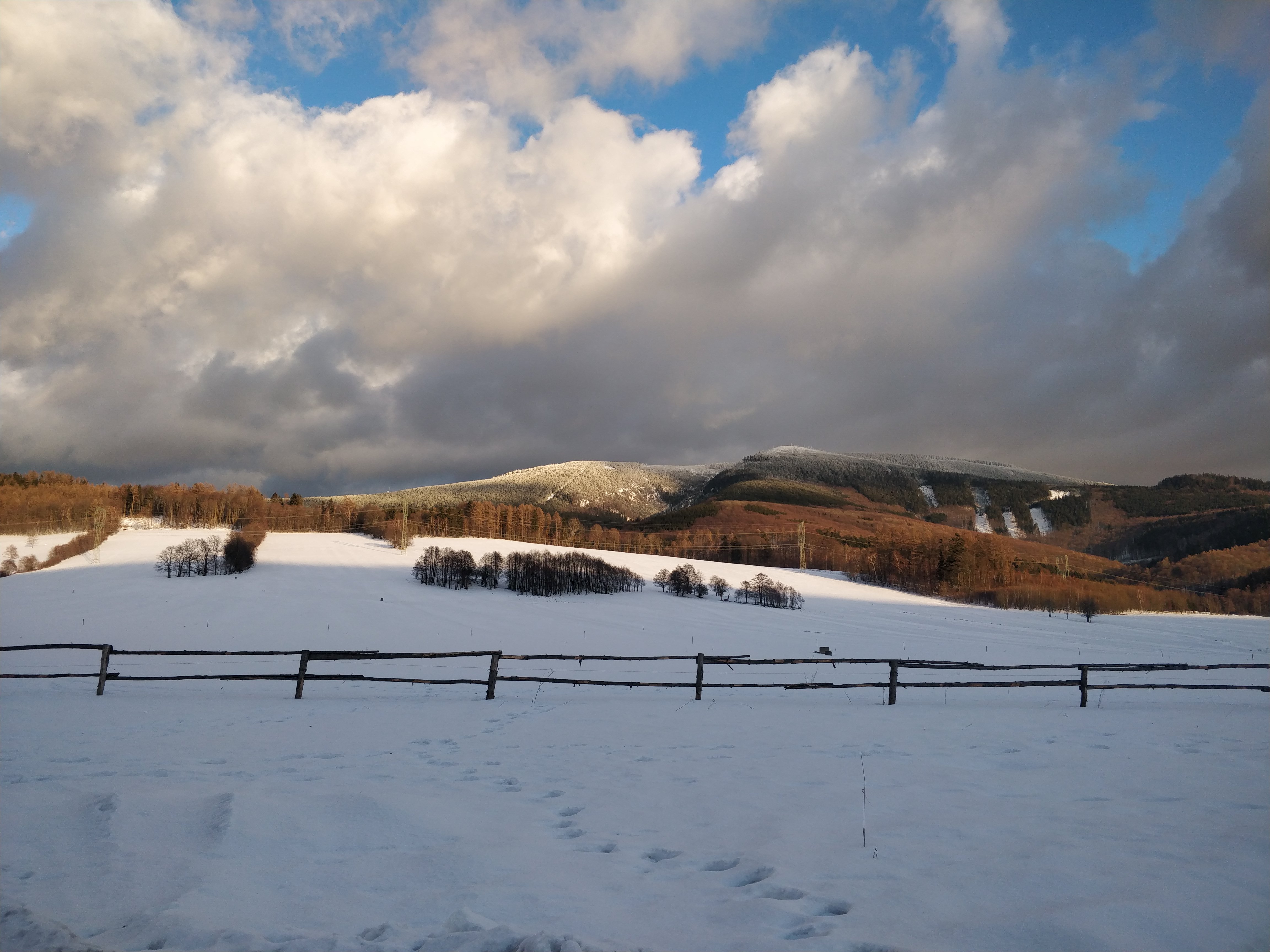
Jesiniky Mountains, Czech Republic.
‘the enemy within’
In a worryingly development last January a seventy-one year-old man, Jaromir Balda was sentenced to four years imprisonment for terrorism. He felled trees to block railway lines, pretending Islamists were responsible by leaving messages at the scene proclaiming Allahu Akbar – ‘God is great’ in Arabic. Two passenger trains hit the trees, but fortunately no one was injured. The far-right sympathiser admitted he had hoped to spread fear of Muslim migrants.[iii]
One may assume Balda – like the really murderous Anders Breivik in Norway – considered his actions a form of tough love to his countrymen: waking them up to the danger posed by the ‘enemy within’ – the miniscule Islamic population of the Czech Republic, a country that has, by and large, displayed an unsympathetic attitude to the plight of refugees, especially those with darker skin.
This racism can partly be attributed to long-standing antipathy towards the indigenous Romany (‘gypsy’) people. In contrast, the pale-skinned foreigner, ‘the ex-pat’, is treated with deference, and a little envy, albeit marauding stag parties have sullied the reputation of the English at least.
Balda’s choice of target was darkly symbolic, potentially evoking fears in day trippers from rural parts into cities; and among city dwellers who take trains all the way to remote regions, along with their bikes and skis. This gives way to the delusion of safety offered by the autonomous car journey, and further fracturing of community.
Inter-continental
Three years ago I travelled by train and bus from Portugal as far as Ukraine, on what was a redemptive trip, fulfilling an ambition to visit the former Soviet Union. Crossing the border from Slovakia into Trans-Carpathian Ukraine a distinct culture came into view. At the interchange of Çop trains halt on account of the different rail gauges used on either side. Stalin had ordered this inconvenience in order to slow down invading armies, and prevent people from easily escaping. An enduring cultural fault line is the result. It felt as if I had reached the limit of a Europe I know as a backyard I have not fully investigated.
I hope to continue regular overland peregrinations, ideally by train, but the cost seems to rise each year, with further privatisations on the horizon. I fear that as train connections lapse, the life blood of Europe will cease to flow. Then we will experience the false freedom of driving our cars on anonymous highways, or taking flights to green zones in historic cities, conveniently cleared of native populations that don’t fit with the desired impression the authorities wish to leave.
As Europeans grow wary of diversity it is worth considering the vital role played by railways in fostering community and tolerance. An annual holiday by train ought to be available to anyone living on the continent, even those on a peripheral island that tore away its tracks after independence. Connecting Europeans, in real comfort, to cities, mountains and the sea is perhaps the greatest service the railways still provide, and with continued intermingling our heterogeneous communities might seem more inviting.
We rely on contributions to keep Cassandra Voices going.
[i] Angelique Chrisafis, ‘France recalls Rome envoy over worst verbal onslaught ‘since the war’’, 7th of February, 2019, The Guardian, https://www.theguardian.com/world/2019/feb/07/france-italy-ambassador-macron-di-maio-salvini-second-world-war, accessed 18/2/19.
[ii] Online Editors, ‘Leo Varadkar: ‘I’m romantic. I love the railways. I had a train set as a kid’’ April 3rd, 2014, https://www.independent.ie/irish-news/leo-varadkar-im-romantic-i-love-the-railways-i-had-a-train-set-as-a-kid-30152502.html, accessed 18/2/19.
[iii] Untitled, ‘Czech pensioner jailed for terror attacks on trains’, January 14th, 2019, BBC, https://www.bbc.com/news/world-europe-46862508?fbclid=IwAR1rLbhjW_fpVyao8MjooDZe4muAR8bYCyyg5I_x1JzL6HytguW0PPoPFPU, accessed 18/2/19.

